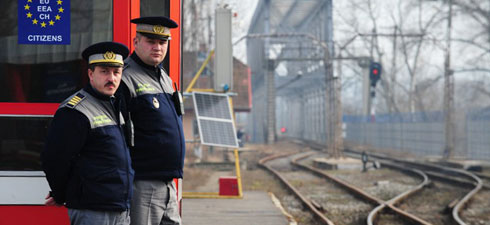**Could those who believe that the recent arrest of dozens of corrupt ticket inspectors will make fare dodging less common in Romania in two years time please raise their hands? You there holding up both your hands, do you also believe that revenue from customs and excise has increased because in February 2011, a number of customs officers and border guards were arrested? Well, you are wrong. Only one thing is certain, we have spent a small fortune on investigation and the infiltration of police forces etc... We have had spectacular arrests in the middle of the night that were followed by release orders issued by the courts a day later. Innumerable cases have been opened, some of which went to court for hearings which will require the hindsight of a few years to assess their utility or futility. But on fundamental level, nothing has changed.
Of course, the customs agents and the ticket inspectors clearly were at fault. But the manner in which we have chosen to fight systemic corruption is completely ineffective.**
Productivity that never took off
Systemic corruption only occurs when there is a major discrepancy between what the state claims to do (or to offer) and what it really does. For example, the state claims to provide medical treatments at prices in-line with the state health insurance system, but the reality is that the insurance system is doubly inadequate. First and foremost because if it were true and everyone began to request these services (tests, surgery), state insurance funds would be not be enough to cover a quarter of the resulting costs. And secondly, because the state pretends to believe that doctors and nurses can do their work for the wages they are paid, which is simply not possible. The shortfall between the official cost of services and the real cost of work is therefore offset by bribes paid by patients to supplement their insurance cover. This is how the balance is established between supply and demand and more realistic prices are set. Arrests are not about to change this. Let’s not forget that they have proved to be ineffective since the time of Nicolae Ceauşescu, who arrested various managers in the hope of boosting productivity, which consistently failed to take off.
The problem of the health service can only be resolved by correcting failed public policy. This also applies for the Romanian rail network (CFR), where fare dodging soared after the virtually simultaneous implementation of the IMF’s clever advice to raise ticket prices and a no less brilliant homegrown plan to cut ticket inspectors wages by 25%. Likewise for customs services and the bid to eradicate cigarette smuggling which peaked in January 2010, in the wake of the government’s decision to raise excise duties. Notwithstanding the European Commission reports that have praised the DGA (Anti-Corruption General Directorate), two thirds of Romanians consider — and I am inclined to believe them — that corruption has continued to increase.
Structural imbalances
If we are to have any success in building a modern state, we will have to put a stop to public policies that create conditions for systemic corruption that cannot be eliminated by repression in the form of the Anti-Corruption General Directorate. The DGA can effectively be deployed to combat large-scale corruption — which is what it was created to do. However, the bulk of corruption in this country, which has been generated by poor policies, can not be eradicated by prosecutors. It can only be tackled by action to redress the imbalances that have been introduced by the state. And such action has nothing to do with repression. However, no initiatives of this kind have been implemented, while repeated arrests, which do not change anything, have become increasingly common. Why?
**The answer to this question is, I am afraid, very simple. To forge ahead with a policy of modernisation, you have to have modernists led by a head of state or of government who understands the issues at stake and wants to change the state — a system reformer like Mikheil Saakashvili. I regret to inform you that we have no such leader: neither our ex-president Emil Constantinescu, or our current President Traian Băsescu have any desire to change the system. And that is not to mention post-revolutionary president Ion Iliescu, who deliberately sought to establish the current system guided by the mistaken belief that more state control reduces corruption, whereas in fact the opposite is the case.
The launch, on the insistence of the European Union, of a number of anti-corruption agencies, which have partial political autonomy has highlighted a major anomaly: politicians do not behave as they should, and even behave as they shouldn’t by obstructing anti-corruption agencies. At the same time, anti-corruption agencies with a brief to provide reports to Brussels try to do what they can, and even attempt to do something they are unable to do when instead of fighting corruption, they target ill-conceived policies — although perhaps they engage in this exercise simply to impress Brussels.
It makes you wonder: is this strategy designed to ensure that those who are arrested will be replaced by others who do exactly the same thing, while the state is dragged into court cases that will carry on for years? Prosecutors are resorting to repression in their attempt to address structural problems in the fields of customs and railways. But these problems can only be resolved by improved policies, and most importantly by politicians who have the will to take action.**
Was this article useful? If so we are delighted!
It is freely available because we believe that the right to free and independent information is essential for democracy. But this right is not guaranteed forever, and independence comes at a cost. We need your support in order to continue publishing independent, multilingual news for all Europeans.
Discover our subscription offers and their exclusive benefits and become a member of our community now!












